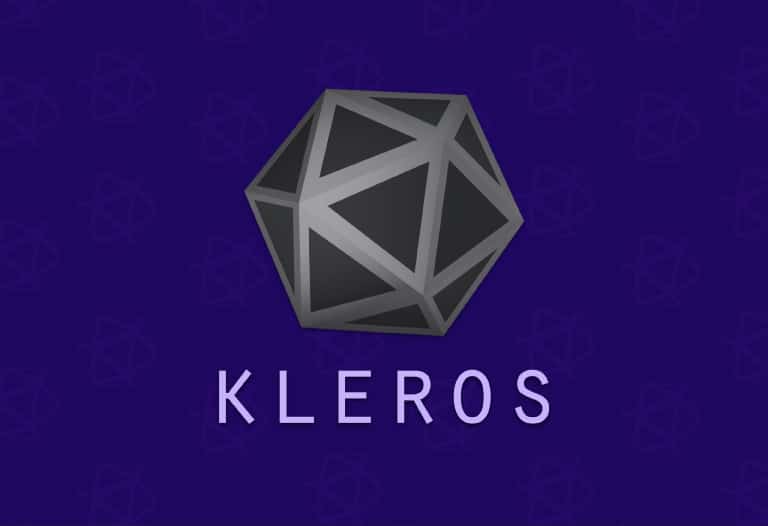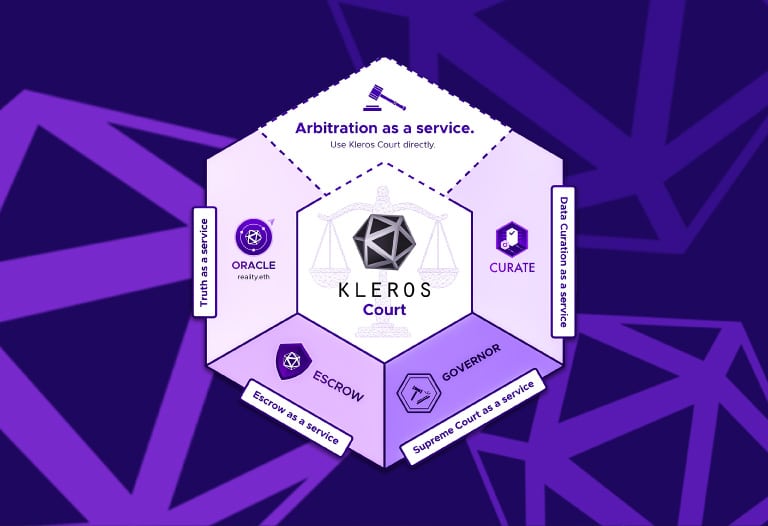
Table of Contents
ToggleJustice is commonly associated with harmony, common good and, above all, truth. Throughout time, the administration of justice has been very important and has its roots in Athens.
Yes, a part of Greece that sounds very old, but we find it interesting because of the myths that exist about great and diverse gods such as Zeus or Hades. It has also been characterized by a large volume of famous philosophers such as Socrates or Pythagoras.
However, what has been most interesting and what has persisted the most in history, have been his political concepts about democracy and cities. Now, what does all this have to do with the world of cryptos?
Precisely, today we will talk about Kleros, an idea that has its roots in Greek justice. In addition, it seeks to combine physical courts and tribunals with the decentralized scenario of cryptocurrencies. Let’s see what it’s all about!
What is Kleros (PNK)? Let’s talk about its origin and definition
Kleros, was founded as Coopérative Kleros in 2017 in France by Federico Ast and Clément Lesaege. It can be conceptualized as an online dispute resolution protocol that uses the Ethereum blockchain and smart contracts to resolve disagreements fairly.
In other words, it acts as a decentralized third party that adjudicates disputes in all types of contracts in a fast, cost-effective and reliable manner.
Historically, Kleros comes from a democratic method of ancient Greece, called kleroterion. This method was used to randomly select people who would make decisions in the political life of the city.
For this purpose, they made use of stone blocks with grooves, in which bronze or wooden plaques, known as pinakion, were inserted with the names of all the citizens of Greece.
Subsequently, by means of a die, the owner of the pinakakion that would be selected for some position was decided. This mechanism is similar to a bingo but made of stone and much more primitive, although quite functional.
From here, we can intuit that its operation will be quite similar, but with the difference that it uses decentralized applications and economic incentives to reach a solution.
How does it work?
To understand how it works, it is necessary to start from two concepts:
Pinakion Token (PNK)
Pinakion or PNK is a type of ERC20 token, specific to this project. And, yes, as you can imagine, it came from the name of the copper or wooden plates that were used in the kleroterion.
This token has two functions:
- Prevent Sybil type attacks by paying a fee to participate in a court.
- Encourage jurors to vote correctly, as each vote has a cost.
The courts of Kleros
Through a contract that establishes clauses, such as that any dispute will be arbitrated by Kleros and that Kleros is a voluntary system, the courts that will take care of this disagreement are determined.
Kleros’ court system starts with a general court, similar to the Spanish general court, which subdivides to specialize in three specific areas of dispute:
- Electronic commerce, where they deal with shipping, international shipping, and freelance (independent work). In this court, for example, they may take a credit card fraud case.
- Transportation, which includes air, sea and land transportation.
- Insurance, which covers automobile insurance, home insurance and commercial insurance.
Each court has a fee value that is paid in crypto Ether (ETH), the currency of the Ethereum blockchain. This value depends on how complex each dispute is and the availability of the chosen jurors.
Undoubtedly, the important thing about this value is that it is sufficient to compensate for the analysis of the evidence and the vote of the jurors, who will receive their payment in equal parts.

What is the dispute resolution process like?
Jury selection
The selection of jurors is by self-nomination and lottery. A person may apply to be a juror in any process by depositing a specific amount of pinakions (PNK).
The value of each cut varies and has a minimum number of PNK. However, the more tokens you cancel, the more likely you are to be a juror.
After payment, the draw takes place. In this draw, a random selection is made from among all users who deposited their token, to whom a case will be assigned and in which court it will be judged.
Once the judges are elected, the tokens paid are frozen. They will only be disbursed once the court has made a decision on the case.
Information analysis
The jurors, as in the common processes of the Spanish justice system, receive the evidence and all the documents necessary for the process.
These data must be reviewed, understood and analyzed to give their verdict on whether, for example, Alice is right or Bob is right.
The complexity of the decision to be made depends on the court, since each court has different parameters for making decisions.
Voting
Once the evidentiary material has been processed, as one would say formally, the jurors comment on their verdict and argue why they consider it to be so.
The winning option is the average number of jurors’ votes or, better called, median.
Therefore, we have a result that is consensual and fair.
Appeal
If you disagree with the court’s verdict, you can ask for it to be overturned.
For this purpose, the court that reviews your case will be made up of people totally different from those who were part of the previous decision.
Additionally, it will be constituted by twice the number of jurors from the previous hearing plus one.
In this regard, it is important to clarify that each time you appeal, you must bear the costs of the process.

Wait, that’s not all. Let’s talk about Kleros’ partner projects
The Kleros courts are governed by four of Kleros’ own projects:
- Oracle: Through Kleros’ Oracle, the parties to the process (defendant and plaintiff, for example) are asked for some specific information and when they reply, they deposit a certain value of PNK. Their answers may vary and it is this that causes a dispute which is resolved by Kleros.
- Escrow: It is a smart contract in which the parties that form it set the terms of the contract. To do so, they request an amount of Ether. If the contract is properly fulfilled, the Ether is released, if it is only partially fulfilled, a part of the Ether is released, and if it is definitely not fulfilled, a dispute is entered into in a Kleros court.
- Governor: He is in charge of the governance of Kleros smart contracts. To this end, he is responsible for enforcing the decisions made within each smart contract.
- Curated List: These are lists that organize information in a decentralized manner, whose data are managed by their users, who can add or remove content from them.
And with this, Bitnauta, we decide that this case is closed.
Our verdict is that the information presented as evidence is definitely not enough to know all the wonders of the projects that Kleros has prepared for us.
But don’t worry, we’ve got it all figured out for you. For this reason, you can follow us on Instagram or stay tuned to our blog so you don’t miss any news from the crypto universe.
Now, if what you want is to be a vigilante hero who analyzes the evidence of a case or participate in the proposals that Kleros has for you, you can visit our official website. There, you can buy ETH quickly and reliably.

